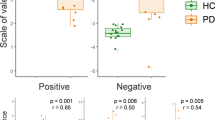Abstract
Parkinson's disease (PD) is characterized not only by a progressive movement disorder but also by a variety of mental disorders, which can be arbitrarily divided into cognitive and emotional–personality disorders. The aim of this investigation was to study the relationship between cognitive and emotional–personality disturbances in patients with PD during learning of emotionally significant words and visual recognition of emotional states. The volume and stability of recall of neutral and expressive words were significantly lower in patients than in healthy subjects, whereas the parameters of word recognition were similar in both groups. Unlike in healthy subjects, the characteristics of recall of neutral and expressive words in patients did not differ considerably. Patients with PD significantly more often incorrectly interpreted emotional states shown in pictures, particularly negative emotions. Deficit in retention of expressive words and recognition of emotional states correlated with the severity of motor and cognitive disorders, particularly of attention and executive dysfunction. The results of our study can be explained by a dissociation of the cognitive and motivational–affective functions in PD because of a disconnection between the basal ganglia, the limbic structures, and the frontal cortex. This dissociation tended to increase with progress of the disease.
Similar content being viewed by others
REFERENCES
Shtok, V.N., Levin, O.S., and Fedorova, N.V., Ekstrapiramidnye rasstroistva (Extrapyramidal Disorders), Moscow, 1998.
Artem'ev, D.V., Age-Specific Aspects of Parkinson's Disease, Extended Abstract of Cand. Sci. (tMed.) Dissertation, Moscow, 1995.
Levin, O.S., Mental Disorders in Parkinson's Disease and Their Correction, Ekstrapiramidnye rasstroistva (Extrapyramidal Disorders), Shtok, V.N., Ivanova-Smolenskaya, I.A., and Levin, O.S., Eds., Moscow: MED-press-inform, 2002, p. 125.
Artem'ev, D.V. and Glozman, Zh.M., Higher Mental Activity in Parkinson's Disease, Dostizheniya v neirogeriatrii (Advances in Neurogeriatrics), Yakhno, N.N. and Damulin, I.V., Eds., Moscow, 1995, p. 46.
Yakhno, N.N., Topical Questions in Neurogeriatrics, Dostizheniya v neirogeriatrii (Advances in Neurogeriatrics), Yakhno, N.N. and Damulin, I.V., Eds., Moscow, 1995, p. 9.
Hubble, Y. and Koller, W., The Parkinsonian Personality, Advances in Neurology, 1995, vol. 65, p. 43.
Aarsland, D., Larsen, J.P., Lim, N.G., et al., Range of Neuropsychiatric Disturbances in Patients with Parkinson's Disease, J. Neurol., 1999, vol. 67, p. 492.
Paulson, G. and Dadmehr, N., Is There a Premorbid Personality Typical for Parkinson's Disease?, Neurology, 1991, vol. 41 (Suppl. 2), p. 73.
Glozman, Zh.M., Shtok, V.N., Saltykova, N.M., et al., Clinical and Psychological Study of Depressive Syndrome in Parkinsonism, Vestnik Mosk. Gos. Univ., Ser. 14, 1995, no. 3, p. 29.
Mendelson, G., Dakof, G., and Scaff, M., Personality Change in Parkinson's Disease Patients: Chronic Disease and Aging, F. of Personality, 1995, vol. 63, p. 233.
Khomskaya, E.D. and Batova, N.Ya., Mozg i emotsii (The Brain and Emotions), Moscow: Izd. RPA, 1998.
Fahn, S. and Elton, R.L., Unified Rating Scale for Parkinson's Disease, Recent Developments in Parkinson's Disease, Fahn, S. and Marsden, C.D., Eds., Florham Park. New York: Macmillan, 1987, p. 153.
Tinetti, M.E., Performance-Oriented Assessment of Mobility Problems in Elderly Patients, J. Am. Geriatr. Soc., 1986, vol. 34, p. 119.
Beck, A.T., Ward, C.H., Mendelsohn, G., et al., An Inventory for Measuring Depression, Arch. Gen. Psychiatry, 1961, no. 4, p. 561.
Spielberger, C.P., State–Trait Anxiety Inventory, Palo Alto, CA: Mind Garden, 1983.
Zakharov, V.V., Memory Function Disorders in Parkinsonism, Extended Abstract of Cand. Sci. (Med.) Dissertation, Moscow, 1996.
Glozman, Zh.M. and Levin, O.S., Mental Disorders in Extrapyramidal Diseases, Ekstrapiramidnye rasstroistva (Extrapyramidal Disorders), Shtok, V.N., Ivanova-Smolenskaya, I.A., and Levin, O.S., Eds., Moscow: MED-press-inform, 2002, p. 74.
Cummings, J.L., Anatomic and Behavioral Aspects of Frontal-Subcortical Circuits, Ann. New York Acad. Sci., 1995, vol. 769, p. 1.
Cummings, J.L. and Kaufer, D., Neuropsychiatric Aspects of Alzheimer's Disease: The Cholinergic Hypothesis Revised, Neurology, 1996, vol. 47, p. 876.
Levin, O.S. and Shtock, V.N., Disconnection between Cognitive and Emotional Function as a Factor of Dementia in Parkinson's Disease and Subcortical Vascular Encephalopathy, Aasborg, Eurobrain, 1997, p. 168.
Ol'shanskii, D.V., On the Experimental Study of Some Personality and Emotional Disorders in Patients with Local Brain Lesions, in Psikhologiya i meditsina (Psychology and Medicine), Moscow, 1978, p. 345.
Vygotskii, L.S., Problemy defectologii (Problems of Defectology), Moscow: Prosveshchenie, 1985, pp. 402–403.
Cummings, J.L., Depression in Parkinson's Disease, Am. J. Psychiatry, 1992, vol. 149, p. 443.
Author information
Authors and Affiliations
Rights and permissions
About this article
Cite this article
Glozman, Z.M., Levin, O.S. & Lycheva, N.Y. Impairment of Emotional Memory and Ability to Identify Emotional States in Patients with Parkinson's Disease. Human Physiology 29, 707–711 (2003). https://doi.org/10.1023/B:HUMP.0000008842.71661.20
Issue Date:
DOI: https://doi.org/10.1023/B:HUMP.0000008842.71661.20




